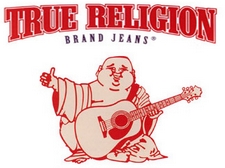
The owner of TrueReligion.com registered the domain name in 1998, many years before the jeans company came into existence. He originally used the domain name to write about Islam. But once the jeans company became very popular, he started using the domain name to profit from the True Religion brand.
The jeans company lost its UDRP domain name arbitration case. In order to win, it would have had to prove that the domain name was originally registered in bad faith back in 1998. That’s impossible since the jeans company wasn’t even around.
Having lost the arbitration, True Religion has now turned to the courts. The company filed a federal lawsuit (pdf) yesterday in U.S. District Court against the domain’s owner, Ali Ibrahim Abu-Harb of Riyadh.
True Religion has a legitimate beef with how the domain name has been used in recent years. That said, I take issue with a couple claims made in the suit.
For example:
61. Defendant has not made any prior use of the Domain Name in connection with the bona fide offering of any goods or services.
Yet the jeans company already stated earlier in its suit that the defendant had used the domain name for a site about Islam.
The suit also doesn’t mention the result of the UDRP case.
In the suit, True Religion also claims that “Defendant, through his agent, offered to sell the Domain Name for $1 million dollars to Plaintiffs”. I’ll be curious to see if this was in response to an overture by the Jeans company, rather than a proactive offer by the defendant. (The exhibit containing this offer has not been uploaded to the court’s docket yet.)
The content at TrueReligion.com recently changed to again discuss religion. It also has a message that the domain name is for sale for $300,000.
The suit does not explicitly ask that the domain name be transferred.






Court expenses in IP litigation can go into the millions, and that’s before a decision. How many can fight this?
Another case of the domain owner being greedy or stupid, honestly like the others, use it in bad faith and infringe on a mark, lose it.
I’m not so sure of that, JP. The ACPA requires “a mark that is distinctive at the time of registration of the domain name” and, in the Ninth Circuit, that means the original registration of the domain name.
Now, if there was some sort of trademark infringement going on, the court can find liability for that, and can enjoin use of the domain name for infringing purposes. However, prevailing on an infringement claim of some kind, as opposed to the cybersquatting claim, does not necessarily translate into “transfer the domain name” relief. The ACPA, which claim is questionable here, is the part of the Lanham Act that deals with “transfer the domain name” as a remedy. Under an infringement claim, there are all sorts of things a court can order besides transfer of the domain name (which is why Uzi Nissan still pretends to sell computers).
This may explain why they don’t explicitly ask for a domain transfer as part of the remedy, at least that I could find.
Check that, it does request the domain name be transferred.
I see, thank you for explaining that John, very interesting.
The question is I suppose, would you rather lose a domain name or suffer the penalty of being found guilty of infringing?
In a case like this is there a minimum fine ($100,000) set for infringement by way of domain in the US or is it simply a matter of what you ask and what is rewarded? Not sure how having a name reg’d prior to the plaintiff’s TM affects this standard, if any.
JP, under the ACPA, the court can award, in its discretion, up to $100K absent actual damages. But as I noted above, this is not an ACPA case. The ACPA requires the mark to have been distinctive at the time the domain name was registered, so that’s not on the table here. But, no, there is no “minimum fine” for infringement. There is a 100K maximum award for cybersquatting.
Now, whatever the facts are in relation to how the domain name was being used etc. I have no idea. But the actual liability for infringement is likely to be pocket change and doesn’t necessitate relief in the form of a transferring the domain name.
However, in all likelihood,the plaintiff is looking for a default by the domain registrant.